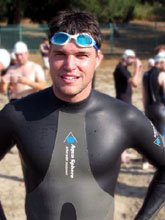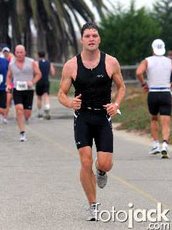 If your gym is like most of the health clubs I know, what you'll see is a handful of exercisers sweating themselves silly, many more than that going doggedly but disconnectedly through the motions, and a full half of them barely moving. Their legs might be lazily turning the pedals of some machine, but their focus is elsewhere: they're reading the paper, they're watching TV, they're talking on their cell phones, for Pete’s sake.
If your gym is like most of the health clubs I know, what you'll see is a handful of exercisers sweating themselves silly, many more than that going doggedly but disconnectedly through the motions, and a full half of them barely moving. Their legs might be lazily turning the pedals of some machine, but their focus is elsewhere: they're reading the paper, they're watching TV, they're talking on their cell phones, for Pete’s sake.You'd think you'd encounter a different vibe in the free weight room, where the hardcore gym elite supposedly toils, scoffing at the efforts of mortals, admiring their crustacean physiques in the mirror. But the cross-section there is no different. Sure, there's more grunting and preening, but anyone who's really pushing their limits, subjecting themselves to a new stimulus which will make their bodies stronger, leaner, faster, more flexible will stand out like Pee-Wee Herman at a biker bar. And, incidentally, such people are often just about as welcome: a gym manager yelled at me once for sweating too much. Not on the equipment, mind you: on the floor.
Oh, the irony.
Look, I applaud anyone’s efforts to get fit. I recognize that the cell-phone stationary biker might have nothing else to give that day. I also recognize that not everyone enjoys pushing his body's limits till he’s a quivering mass of semi-organic goo on a daily basis like I do. I also know that there are people out there who are reasonably happy with how they look and feel and just go to the gym to maintain where they're at, unwind, chat with friends, maybe sit in a steam room and relax a little. Different goals, different personalities.
So why don't I just clam up, do my own frantic, heart-attack-inducing workouts, and keep my judgments to myself, Fitness-Obsesso-Boy?
I really should.
But here's this week's wouldn’t-it-be-nice sentiment: Most people are in the gym to affect change, and very few of the workouts I see people doing are effective in this regard. I can live with that -- begrudgingly. But what baffles me to my core is this: if people are paying good money for gym memberships and then taking valuable time to work out, why in Sam Hill don’t they at least pay attention to the workout itself? Such workouts are like placeholders for the workout that you think you'll have the energy and inclination to do someday…but not today.
In our busy lives, a few stolen hours a week to exercise are golden, friends. Even if you're going to creep like snail unwillingly to fitness-school on the treadmill, even if you're going to keep your weights perpetually light because you "don't want to bulk up!" at least pay attention to what you're doing. At least enjoy moving, enjoy breathing a little harder than usual, at least spend some time appreciating what Fiona Apple calls the "extraordinary machine" we live in. It may be the most rewarding part of exercise.
Long after the days of 250-pound bench presses, I hope I’ll be like the trim, energetic man I met doing laps at the pool the other day, who swims for an hour a day, seven days a week, rain or shine. He looks to be about 15 years younger than his 72 years.
What I'm talking about here is mindfulness, folks. Paying attention, showing up, being in the moment. Our busy lives threaten at every turn to transform our bodies into brain-housing devices, troublesome and demanding mechanisms useful only in moving us around so we can hook up to another machine and perform more income-generating work. For many of us, the only chance we get to remedy this mind-body schism is during those few hours we set aside to exercise. But the cardio- and weight- zombies described above are doing quite the opposite: they're doing one thing with their bodies (exercising) and quite another with their minds (cell phone, TV, chatting with friends), thus widening the very mind-body gap that focused exercise can help to close.
 So what's to be done?
So what's to be done?Well, working out hard is one solution, and, by now, you can probably guess is the solution that works for me. It's tough to space out too much when you've got hundreds of pounds of iron slung across your shoulders, or when you're staring down the business end of hill number seventeen on Mulholland Drive.
And that’s not the only way: T'ai Chi practitioners are the picture of mindfulness, and their workouts aren't of the sweat-buckets variety. Most martial artists are as well, but I don't think you have to go to the Far East to find mindfulness: check out a spinning class and chances are you'll find the same focused intention I'm talking about.
But really, and I've said this before, the activity itself isn't important. As the 2-man luge and the curling competitors in the Olympics have shown us these last few nights on TV, you can be mindful doing anything — even your same old workout. Give it a try next time — it takes no more time and only marginally more effort. Go ahead and do the same thing you always do, just pay a little more attention: be aware of the space around you, of the way your body feels, of the feel of the weight or the road beneath you. At the end of your workout, whether your pushed your limits or not, you'll feel focused and alert instead of distracted and rushed.
String enough of those workouts together and pretty soon you have a form of practice, something that complements and supports your daily activities rather than serves as yet another distracting obligation. And that's a pretty good feeling.
Have a great week,
Andrew

 I may be cutting off my nose to spite my face here, but the fact is that you don't necessarily need weight training and aerobics, as we normally think of them, to achieve optimum fitness. The bodybuilding and fitness magazines would like to you believe otherwise, with their "Great Thighs In Three Moves!" articles, but as I've said before, you can skin the fitness cat just about any way you want. The key is finding the "want" part--that activity you can be wholehearted about.
I may be cutting off my nose to spite my face here, but the fact is that you don't necessarily need weight training and aerobics, as we normally think of them, to achieve optimum fitness. The bodybuilding and fitness magazines would like to you believe otherwise, with their "Great Thighs In Three Moves!" articles, but as I've said before, you can skin the fitness cat just about any way you want. The key is finding the "want" part--that activity you can be wholehearted about.
 Just remember this: there’s nothing inherently noble or ridiculous about ANY athletic endeavor. They're all silly, and they’re all great--in part, arguably, because they ARE silly. Like your ma told you, it's how you play the game. Find something YOU can invest in, something that makes YOU excited, and you're golden. Then you'll never hear yourself say, "Oh my god, another 20 minutes of cardio" again. You'll say, "Hey it's Saturday, time for my softball game!" Or "In two weeks I get to SCUBA dive." Or go on a hike, or play jai-alai, or whatever it may be.
Just remember this: there’s nothing inherently noble or ridiculous about ANY athletic endeavor. They're all silly, and they’re all great--in part, arguably, because they ARE silly. Like your ma told you, it's how you play the game. Find something YOU can invest in, something that makes YOU excited, and you're golden. Then you'll never hear yourself say, "Oh my god, another 20 minutes of cardio" again. You'll say, "Hey it's Saturday, time for my softball game!" Or "In two weeks I get to SCUBA dive." Or go on a hike, or play jai-alai, or whatever it may be. I’ve seen again and again that linear progress—absolutely rock-solid, straight-up-the-mountain improvement with no plateaus and no switchbacking—is a myth. It doesn’t really happen. We like to believe it can and does, not only in fitness but in all aspects of our lives: career, finances, living situation, family. On some level we believe that everything should be constantly improving, and that those trends just go on and on until we DIE, fabulously rich and famous, running 3-minute miles and benching 1500 pounds, surrounded by beautiful supplicants, a trunkload of Most Improved Player awards in the back of our each one of our seventeen Ferraris.
I’ve seen again and again that linear progress—absolutely rock-solid, straight-up-the-mountain improvement with no plateaus and no switchbacking—is a myth. It doesn’t really happen. We like to believe it can and does, not only in fitness but in all aspects of our lives: career, finances, living situation, family. On some level we believe that everything should be constantly improving, and that those trends just go on and on until we DIE, fabulously rich and famous, running 3-minute miles and benching 1500 pounds, surrounded by beautiful supplicants, a trunkload of Most Improved Player awards in the back of our each one of our seventeen Ferraris.

